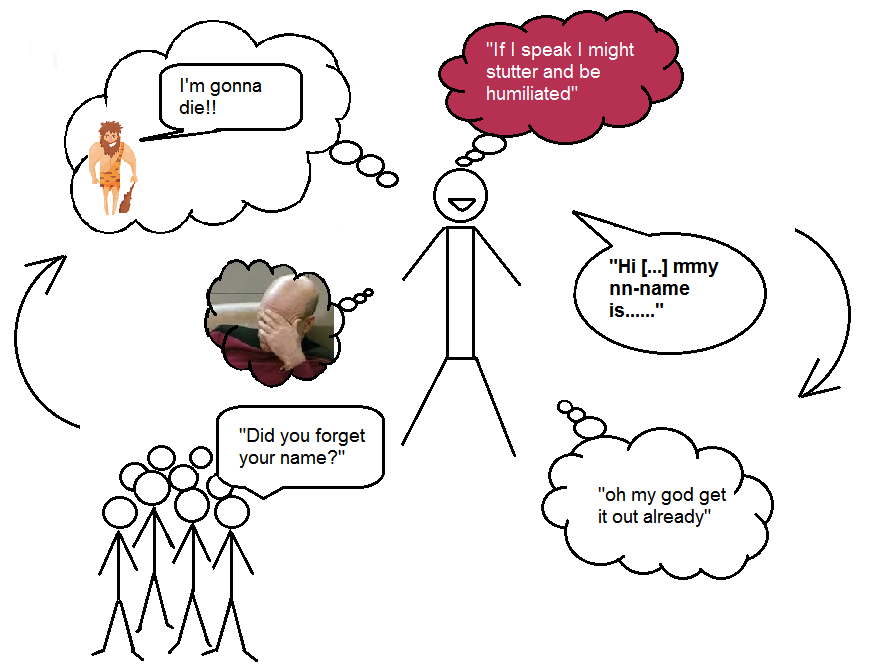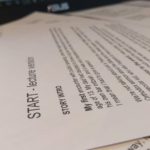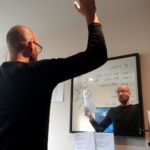Are you afraid of public speaking?
My first encounter with public speaking, other than regular classroom experiences, was at the age of thirteen. My dad had decided to throw a big bar mitzvah party for me. You see, he’d never had his own bar mitzvah, and it was very important to him that I have a proper one. And by “proper,” I mean that I had to give a speech.
We’re not talking about just a “thank you, enjoy your meal” type of a speech, but a pre-written orthodox sermon. A very natural thing for a thirteen year old, secular kid who also happened to have a severe stutter.
In the weeks prior to the event, I was excited. I dealt with who to invite and what to wear. I tried not to think too much about the speech. Since I’d made a great effort to avoid speaking in class, I didn’t really know what was heading my way anyway. How bad could it be?
At the event, with my ‘90s style oversized groom outfit and my Keanu Reeves hair (I still had hair back then), I was still completely unaware of what I got myself into.

Once dinner was finished, I was led to the dance-floor, with a microphone in one hand and an extremely long written sermon in the other. There, in front of a hundred family members and friends, half of whom I didn’t know, I started reading.
And the trauma started.
I struggled with every syllable
of every word,
in every sentence.
Soon enough I realized that the best outcome of the situation would be that by the time I finished reading, the audience would be so bored that they’d have fallen asleep.
After an eternity of butchering my rabbi’s history lesson and best wishes for the Jewish people, I got to the end of the page. The crowd’s anticipation for this mutual torture to end could had been cut with a butter knife.
And then, I turned to page two.
The sigh of despair that went through that poor audience is something I will never forget. Needless to say, public speaking would be associated in my head with humiliation from then on.

Stuttering, Public Speaking Anxiety and Social Anxiety
Many people find it difficult to speak in front of people. The fear of public speaking (or public speaking anxiety) is called glossophobia. It is estimated that three of every four people experience this anxiety to varying degrees.
For some people, the fear of public speaking is worse than the fear of death! It’s easy to understand why this fear is so deep and common once we understand that our prehistoric ancestors relied on living in a group as a survival skill against the harsh elements and large predators. Public speaking exposes us to being rejected from the tribe, which in our prehistoric mind meant one thing: death.
Public speaking anxiety is a type of Social Anxiety Disorder (or SAD). In very broad strokes, while both revolve around the fear of being judged or humiliated, social anxiety is a persistent fear of social situations generally, and public speaking anxiety is focused on specific scenarios of speaking in front of a group of people.
Stuttering and SAD often share many of the same features. We all know these very well: avoidance of feared situations, hyper-sensitivity to our speech and to people’s reactions to it, anxiety and negative thoughts before talking, etc.
These similarities can be explained by the biases we have when processing information during these stressful situations. In simple words, we focus more on our fears and negative inputs in these situations, rather than the positive inputs. This is a core feature that both people who stutter and people with SAD share.
Before you start panicking though, if your symptoms solely revolve around your stutter, you’re not going to be diagnosed with a social anxiety disorder.
That said, there have been many studies about stuttering and SAD that found an alarming correlation:
Between a quarter to two-thirds of people who stutter meet the criteria for social anxiety disorder.
Want to test how much social anxiety you have? Check the source links at the bottom.

Stuttering VS fear of public speaking
Many years after my bar mitzvah experience, I stumbled across a Youtube video analysing a situation of a man hyperventilating as he tried to address a large committee. I thought to myself, “Hey, that’s what often happens to me when I have a bad stuttering day”. This similarity got me curious, so I started researching it and it led me to look for a beginners’ public speaking group. I had already jumped through many “rings of fire” and I felt I was ready for this challenge.
In these public speaking practice sessions I got the chance to meet a lot of people who have public speaking anxiety. I found it fascinating how similar public speaking anxiety is to what happens in the head (and sometimes the body) of a person who stutters.
The physical aspects
Some of the symptoms they talk about can be attributed to general stress or excitement that are not necessarily speech-related; things that everyone experiences like pounding or fast heartbeat, blushing, butterflies in the stomach, sweaty or cold hands, muscle tenseness, etc. Other stress symptoms can manifest themselves in the speaking system as well, like a constant urge to clear the throat, and cracking or changing of the voice. In all these cases, people are aware of what’s happening to their speaking ability but feel they’re not in control of it; much like with a stammer.
There are also external physical nervousness symptoms people with public speaking anxiety have during their speeches. It’s not uncommon to see people in the group speak while knowingly or unknowingly pacing back and forth, constantly pulling their shirts, leaning on things, speaking very quickly or monotonously, etc. It takes them a conscious effort to notice and control these behaviours. They don’t actually need to do them, but it’s their body’s way of dealing with the uncomfortable situation; sounds familiar, right?
Doesn’t it remind you of all those secondary stuttering behaviours, all those things we do with our bodies, sometimes subconsciously, that for some reason we feel would help us get through uncomfortable stuttering situations?
For example, sometimes I catch myself walking while I’m on the phone, and I’m limping on certain words, as if it’ll help me to get the words out. Then I’m immediately thinking “why did I just do that”?

The Psychological aspects
This is where it really hits home. The similarity of the psychological aspects of public speaking anxiety and stuttering is astonishing. When listening to someone talk about their mental stress about public speaking, it sounds exactly as if they were talking about stuttering. Here are just a few of the examples people shared with me:
-
-
- Random changes in anxiety levels on different days that can’t be explained.
— Exactly like there could be random good or bad stuttering days. - “Playing a role” is always easier than talking as yourself.
— It is also known that people who stutter will often be completely fluent when “playing a role”. Even more so if it includes any kind of speech modification (different voice, accents, etc.). - A type of “death row” feeling as anxiety grows more and more while waiting for their turn to speak (e.g, introducing yourself to a group).
- Anxiety that starts building weeks (or months!) ahead of the speaking event.
— The levels of anxiety can build so high, one person told me he intentionally caused a car accident in order to avoid a stressful work presentation. - Different public speaking scenarios could be more challenging than others. Some find it most stressful reading aloud, while others find it harder to introduce themselves, or even speaking at meetings.
- Random changes in anxiety levels on different days that can’t be explained.
-
Sound familiar?
The differences
For most people I’ve met who have public speaking anxiety, the fear before speaking in public is usually worse than the situation itself. They can “ride the wave” once they start speaking, even if there’s some degree of anxiety. Often times, it’s hard to tell when a person was very anxious before or while speaking, as their symptoms, for the most part, aren’t physical. This means that for the majority of people, the more they practice public speaking, the more their related anxiety lessens.
For most people who stutter, the basic fear of stuttering almost always comes true; and if that weren’t enough, it happens every time we speak, not just in specific situations.
We fear that we’re going to stutter → we usually do → it gets worse → someone might ask us if we forgot our name (negative feedback) → our prehistoric mind yells “I’m gonna die!” → the fear is reinforced and the cycle continues.

Because of this cycle being engraved so deeply within us from an early age, if left unattended, the fear of stuttering might grow so deep that we’ll try to avoid speaking and expressing ourselves verbally altogether. I’m exaggerating to make a point, though I have met some people who meet that description. If you can’t relate to any of this, consider yourself very lucky to have had parents and teachers who did such a good job.
“Individuals who stutter have a much higher risk of developing SAD than the general population due to bullying and negative peer responses that often begin in childhood, and it has been suggested that social anxiety increases the risk of relapse for adults who stutter following speech treatment due to situation avoidance.” (Flinders University on Medical Xpress, 2018)
This is why it is crucial that we keep working on our well-being and eradicate the fear of stuttering, rather than stuttering itself.
But how?
By constantly challenging ourselves, pushing the boundaries of our comfort zones, and strengthening our mental and emotional resilience.
Practising Public speaking
We need to invest in redirecting the fear of stuttering into a drive to express ourselves, to stop thinking about fluency as a goal and start thinking about the bigger picture of how we want to convey our message.
Speaking, in a way, is similar to playing an instrument. It’s one thing to perform really well in your practice room, but the only way to be prepared for performing in front of people is to perform in front of people.
Having seen the confidence of people who once had public speaking anxiety, and seeing the changes in myself and in other people who stutter, I know public speaking is an amazing practice tool for people who stutter.
If you are ready for such a challenge, here’s what you can gain from practising public speaking:
- You’ll desensitize yourself from stuttering in front of strangers, and learn that the sky won’t fall if you do.
- You’ll get more confident and comfortable with speaking and expressing yourself in front of people.
- You'll raise your self-esteem by conquering your fears and expanding the limits of your comfort zone.
- You'll may improve the physical aspects of your speech over time, and become more fluent.
When I prepare for giving a talk and imagine how successful I want my performance to be, the first image that always springs to my mind is being fluent. The yearning for fluency is so innate in a stutterer’s mind; we need to be conscious of it. I always need to consciously teach and remind myself that fluency is not the goal. What’s more important is what I want to say, how I want to say it, and what energy I want to convey.
This is a lifelong journey.
The ability to comfortably express ourselves in front of people whether giving presentations, in a meeting or just a friendly chat, is an essential skill in every part of life. You might as well invest in yourself and practice it, stutter or no stutter.
Go express yourself!







